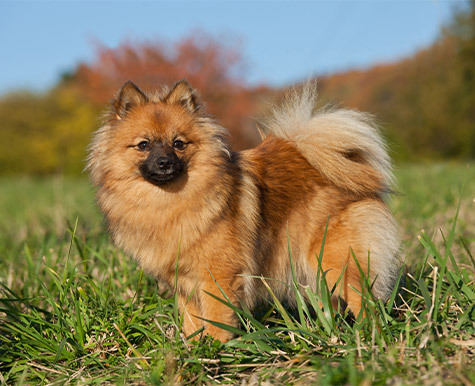






German Spitz
 Overview
Overview
Overview of German Spitz
Although very similar in appearance to the Pomeranian, the German Spitz is a unique breed originating from Germany. Like other Spitz breeds, they also have a plush double coat, a curled tail and pricked ears. The German Spitz is one of the oldest breeds around - its lineage traces back over 5000 years. This breed is not officially recognized by the AKC (American Kennel Club), but they are part of their foundation stock registry for rare canines. The German Spitz comes in 2 different sizes: Klein (small) at 18-22 lbs and Mittel (medium), which is 24-26 lbs. Klein (small) is by far the more popular size. These sturdy, foxy-faced pooches come in black, brown, cream, gray, orange, or red and white. Their beautiful silky coat should be brushed several times per week to remove dirt, debris and loose fur. Originally bred as a hunter and guard dog, the German Spitz later became a popular pampered pet amongst royal families in the 18th century!
Common Health Conditions & Recommendations for German Spitz
Dental Disease:
Is a common German Spitz health issue. Their short muzzle and jaw are often too small to accommodate all of their teeth, resulting in overcrowding. The overcrowding of their teeth combined with a soft food diet may encourage bacteria and plaque overgrowth.
Recommendations for Dental Disease in German Spitz Dogs:
Common Health Conditions & Recommendations for German Spitz
Obesity:
With their small stature and propensity to laze about with their humans, German Spitz Dogs are prone to obesity. They require at least 30 minutes of daily exercise and a balanced diet to keep them fit and healthy.
Recommendations for Obesity in German Spitz Dogs:
Common Health Conditions & Recommendations for German Spitz
Diabetes Mellitus:
If your German Spitz becomes obese, there is a good chance that they will develop canine diabetes as a secondary issue.
Recommendations for Diabetes Mellitus in German Spitz Dogs:
 Personality
Personality

The German Spitz is a high-energy ball of fun that loves to play, chase small animals and keep an eye out for intruders. They are known for their watchdog prowess, so be prepared for a vocal pup! Extremely affectionate and family-friendly, these dogs are dead set on following their humans around from room to room. German Spitzes would do well in households with small children or other canine pals. They can be more than stubborn so, with a little patience, persistence and early socialization, your almond-eyed cutie will have great manners in no time! The German Spitz prefers a large yard where they can run around all day, so they may not be the best pet for apartment living. If you're interested in a beautiful, luxurious pup that loves being spoiled by the entire family, a German Spitz may be your perfect pet.

 USD
USD
 Canadian Dollars
Canadian Dollars
